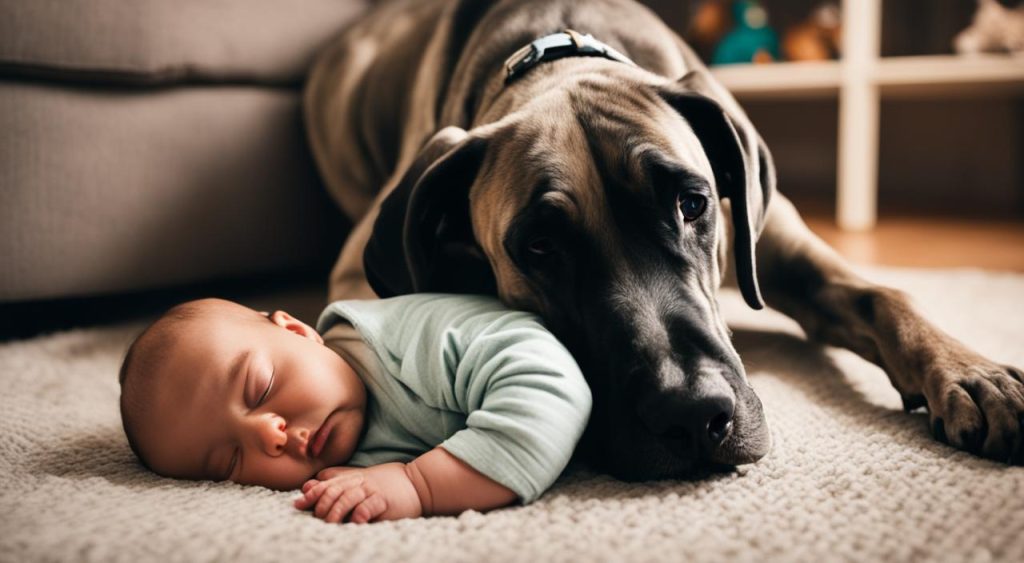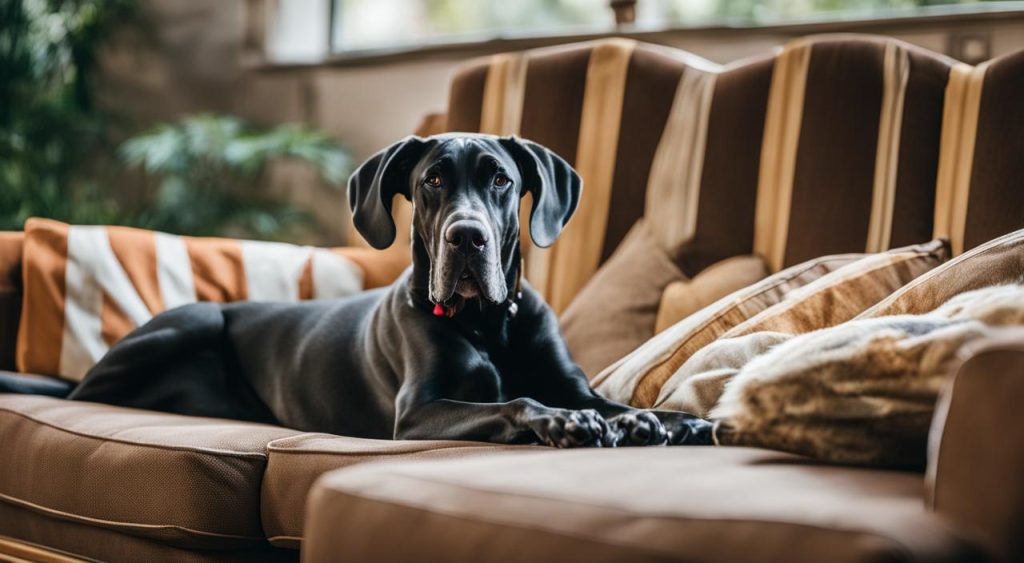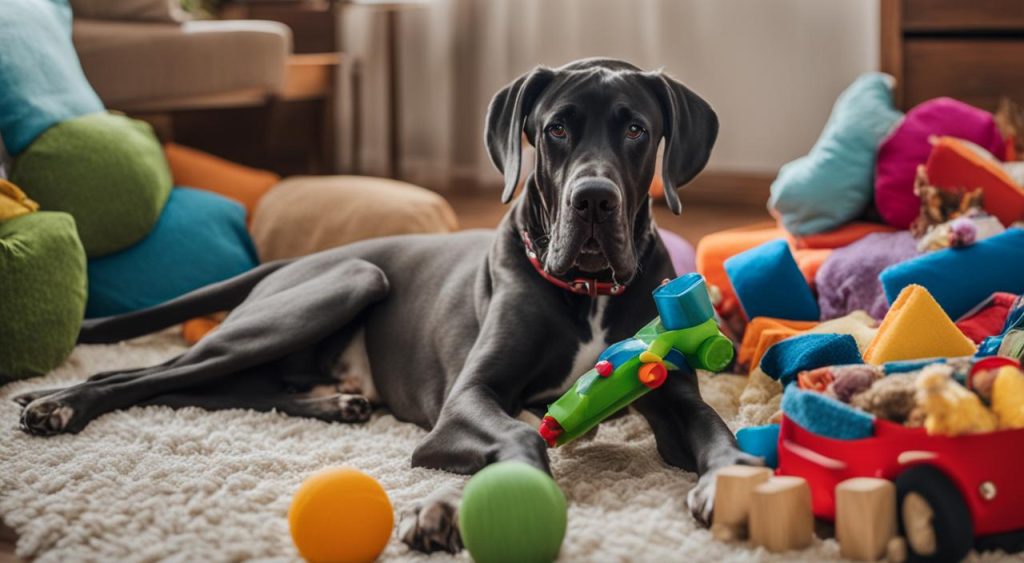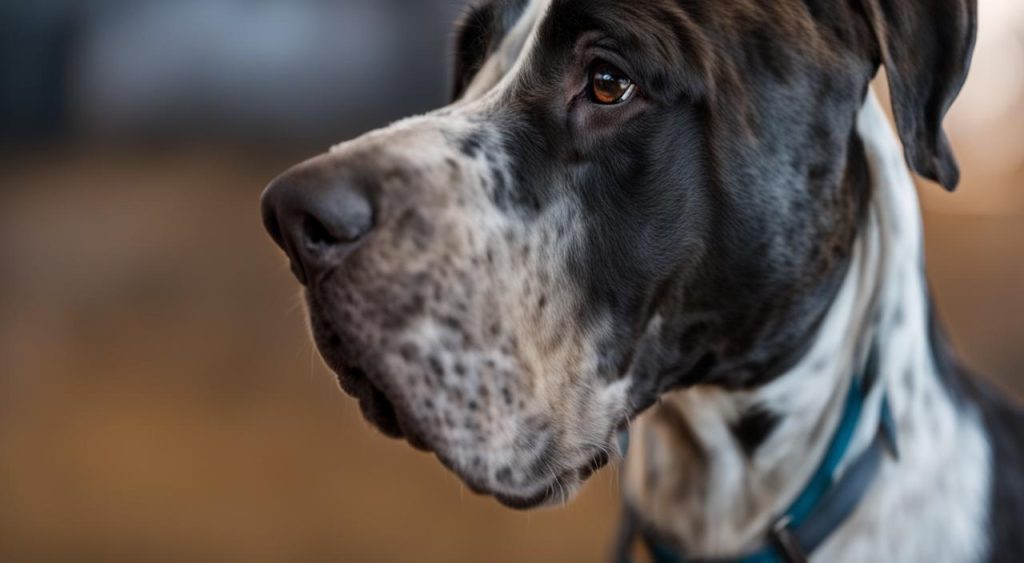Despite their large size, Great Danes are generally very good with children. They are known as the “gentle giants” of the canine world and make great family pets. However, proper socialization and training are essential for a harmonious relationship between Great Danes and babies. Great Danes have a calm and even-keeled temperament, which makes them well-suited for interacting with kids. They are patient, loving, and have a high tolerance for young children. While their size can be a consideration, with proper supervision, Great Danes can be gentle companions for babies. It’s important to teach children how to interact safely and respectfully with dogs.
Key Takeaways:
- Great Danes are generally good with babies and make great family pets.
- Proper socialization and training are important for a harmonious relationship between Great Danes and babies.
- Great Danes have a calm and even-keeled temperament, making them well-suited for interacting with kids.
- With proper supervision, Great Danes can be gentle companions for babies.
- Teaching children how to interact safely and respectfully with dogs is crucial.
Size and Temperament of Great Danes
Great Danes are one of the largest dog breeds, with females reaching up to 30 inches in height and males reaching up to 32 inches. Despite their size, they have a calm and gentle temperament, which makes them good with kids.
Great Danes are generally reserved pets who are content to be lap dogs on the couch with their family members. They are usually very calm around children, but it’s important to teach children how to interact safely with them.
Proper socialization and training are important to ensure that Great Danes understand boundaries, especially when it comes to their size. While they usually get along well with other pets, they can have a jealous streak, so proper socialization is important if there are other dogs in the home.
Trainability and Health of Great Danes
Great Danes are generally considered easy to train, but they can be somewhat stubborn. Positive reinforcement training methods work best with Great Danes. They respond well to praise, treats, and consistent training techniques.
When it comes to their behavior around babies, it’s important to teach Great Danes boundaries, especially considering their large size. Training them not to run in the house and not to approach unfamiliar young children or strangers without permission is crucial.
Training Great Danes to be well-behaved around babies involves teaching them to be gentle and calm. They should learn to be patient and avoid jumping, pulling, or exerting too much force around babies. Consistency and positive reinforcement go a long way in ensuring a safe and loving environment for both the dog and the baby.
In terms of health, Great Danes have a shorter lifespan compared to smaller dog breeds, averaging about 7 to 10 years. It’s important to provide them with proper veterinary care and attention to ensure their overall well-being. Regular check-ups and staying up-to-date with vaccinations can help prevent health issues.
Great Danes are prone to health problems such as bloat, which is a life-threatening condition characterized by a twisted stomach. Owners should be aware of the signs and symptoms of bloat and seek immediate veterinary assistance if necessary. Musculoskeletal problems like arthritis and hip dysplasia are also common in Great Danes, so it’s important to manage their weight and provide them with a comfortable living environment.
In conclusion, despite their size, Great Danes can be trained to be well-behaved around babies. With their calm and gentle temperament, they have the potential to be excellent companions for children. However, maintaining their health and well-being requires regular veterinary care and attention. Great Danes can be wonderful additions to families with babies, bringing love, loyalty, and a gentle presence into the home.
Conclusion
Great Danes can be gentle and affectionate companions for babies and make excellent family pets. Despite their large size, with proper socialization, training, and supervision, they can coexist harmoniously with young children. Their calm and even-tempered nature makes them well-suited for interaction with kids.
Teaching children how to respect boundaries and interact safely with Great Danes is important to ensure a positive relationship. By instilling proper behavior and etiquette, children can enjoy the company of these gentle giants while staying safe.
While Great Danes may have some health issues to be aware of, such as bloat and musculoskeletal problems, regular veterinary care and a healthy lifestyle can help manage these challenges. By maintaining a balanced diet, appropriate exercise, and scheduling regular check-ups, you can ensure your Great Dane remains happy and healthy.
Overall, Great Danes can be wonderful additions to families with babies, providing love, companionship, and a loyal watchdog. With their gentle nature and loving disposition, Great Danes can create lasting memories and build strong bonds with your little ones.





